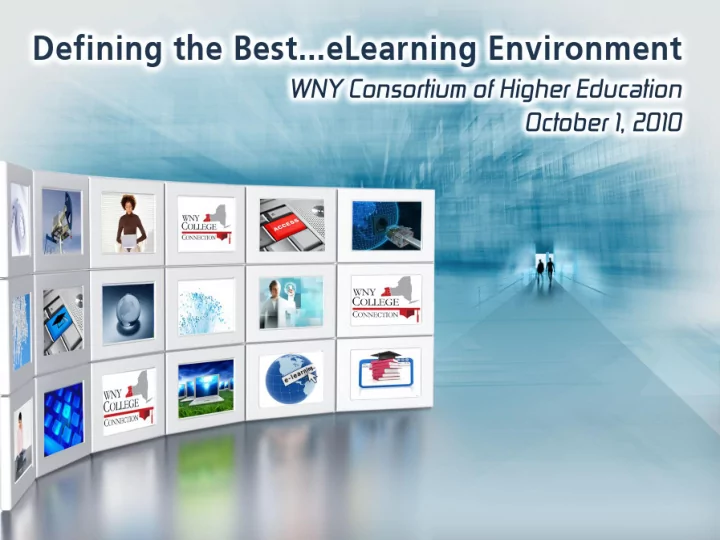

Distance Distance Education Distance Education
Distance education used to be about the distance. 1700s 1800s 1900s 2000s
Distance Education Distance Education Education
A Course… …is a course.
Good Teaching… …is good teaching.
Defining the Best … The eLearning Environment Quality Online Courses
Design vs. Delivery The faculty member is integral to both design and delivery. Course Design … Course Delivery … is the forethought & is the actual teaching planning that a faculty of the course, the member puts into the implementation of the course. design. QM is about DESIGN- not delivery or faculty performance
The Rubric (2008-2010) Research Literature http://www.qualitymatters.org
WNY Subscribers • Canisius College • The Griff Guide to Teaching Online • Jamestown Community College • Monroe Community College • Niagara County Community College
QM is… A toolset and a process
The Rubric Eight General Standards : Course Overview and Introduction 1. Learning Objectives (Competencies) 2. Assessment and Measurement 3. Key components Resources and Materials 4. must align. Learner Engagement 5. Course Technology 6. Learner Support 7. Accessibility 8.
Defining the Best … The eLearning Environment Online Educators
Educators’ Hall of Fame
Readiness for Online Teaching Faculty Self-assessment Tool for Online Teaching Preparedness Penn State
Teaching Preparedness • Organization and time management • Communications skills • Teaching experience • Online learner experience • Technical skills • Academy of Excellence at AACC Competencies for Online Teaching Success http://psuwcfacdev.ning.com
Defining the Best … The eLearning Environment Effective Online Teaching
Seven Principles for Good Practice Encourages contacts between students and faculty. 1. Develops reciprocity and cooperation among students. 2. Uses active learning techniques. 3. Gives prompt feedback. 4. Emphasizes time on task. 5. Communicates high expectations. 6. Respects diverse talents and ways of learning. 7. The principles are based on 50 years of higher education research (Chickering & Reisser, 1993).
Seven Principles of Effective Teaching: A Practical Lens for Evaluating Online Courses By Charles Graham, Kursat Cagiltay, Byung-Ro Lim, Joni Craner, and Thomas M. Duffy (2001)
Effective Online Teaching • Learner engagement • Teaching methods • Learner assessments Activity: Index Card
Engaging the Online Learner By Rita-Marie Conrad and J. Ana Donaldson (2004)
Proof of Learning
What is Classroom Assessment? Classroom Assessment is a simple method faculty can use to collect feedback, early and often, on how well their students are learning what they are being taught….Provide faculty and students with information and insights needed to improve teaching effectiveness and learning quality….in order for students to become more independent, successful learners ~Thomas A. Angelo and K. Patricia Cross~
A Must- have Text… • Classroom Assessment Techniques: A Handbook for College Teachers • Thomas Angelo and K. Patricia Cross • Jossey-Bass Higher and Adult Education Series (1993)
Authentic Learner Assessments • Authentic tasks that will arouse curiosity • Challenging students to rethink their assumptions • Application to real world settings Jon Mueller Professor of Psychology North Central College, IL (2006)
Student Success begins…in the Classroom Building Online Learning Communities • Presence • Interactions and Collaboration • Learner-content • Learner-learner interactions • Instructor-learner interactions
Defining the Best…The eLearning Environment Student Success
Floyd and Casey-Powell Model • Learner Intake Phase • Learner Intervention Phase • Learner Support Phase • Learner Transition Phase • Measurement Phase Floyd, D. L., & Casey-Powell, D. (2004). New roles for student support services in distance learning. New Directions for Community Colleges , 128, 55-64.
Learner Intake Phase Students need information about online learning, admissions, online programs, placement testing, contact information, financial aid, scholarships, and orientation to the college. Students need to determine whether or not online learning is appropriate for their learning style, level of motivation, and personal needs.
Learner Intervention Phase This phase begins with the student’s first online course. Students learn how to become effective online learners. They learn about the institution’s services that are designed to support students, such as tutoring, library services, and technical support .
Learner Support Phase The Learner Support Phase covers the remainder of the Thursdays with Joyce! semester (week 2 and beyond). Distance Learners, you now have an online advisor just for you! Students develop additional skills that lead to successful On Thursday evenings, from 6:30 – 7:30 p.m. , join Academic Advisor Joyce Murphy course completion. Students as she answers your general academic may develop these skills by questions. To participate, all you need are working with faculty, academic speakers (required) and a microphone advisors, and other support (optional). Go to http://www.aacc.edu/virtualcampus/virt staff . ualmeeting.cfm for directions on setting up your computer. It’s easy and will only take a few minutes.
Learner Transition and Measurement Phases Students receive career and academic advising as part of the Learner Transition Phase . The institution examines the effectiveness of its online student services by assessing retention, graduation, and persistence rates during the Measurement Phase .
Defining the Best … The eLearning Environment
Jean M. Runyon, Dean Virtual Campus Anne Arundel Community College 101 College Parkway Arnold, MD 21012 jmrunyon@aacc.edu 410-777-1249
Recommend
More recommend